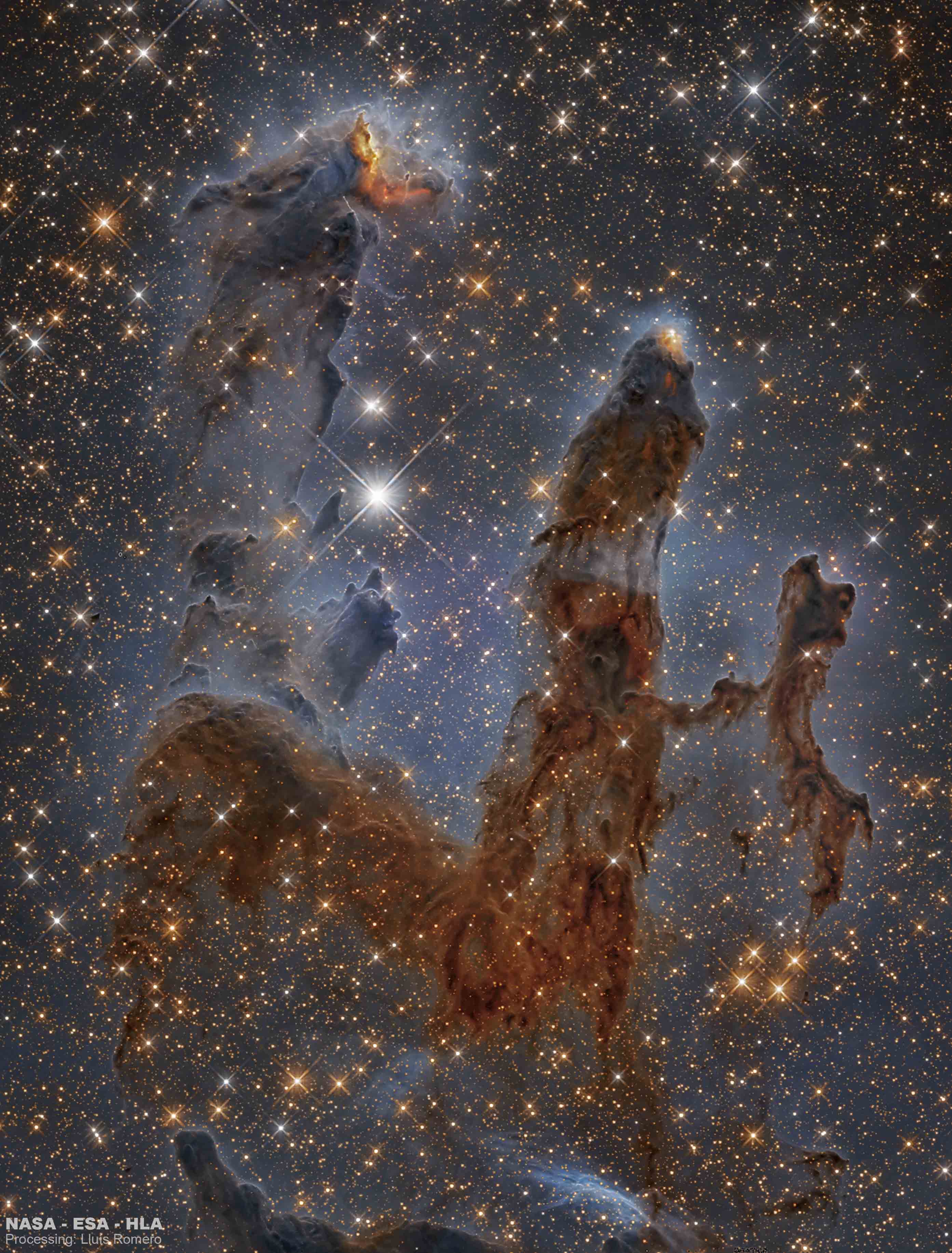07. March 2021
Tī 紅外線 ê 鴟鴞星雲 ê 柱仔雲

探索宇宙1!逐工會揀一幅無仝款 ê 影像抑是相片,𤆬你熟似咱這个迷人 ê 宇宙,閣有專業天文學者2為你3解說4。
- 原始文章:Pillars of the Eagle Nebula in Infrared
- 影像來源:NASA, ESA, Hubble, HLA; 資料處理:Luis Romero
- 台文翻譯:An-Li Tsai (NCU)
[漢羅] Tī 紅外線 ê 鴟鴞星雲 ê 柱仔雲
新 ê 恆星 tī 鴟鴞星雲內底產生矣! Tī 實密 ê 氣體 kah 塗粉 ê 柱仔雲 內底,重力收縮產生新 ê 恆星。 這寡新形成 ê 足光 ê 恆星,in 足強 ê 輻射 kā 邊仔 ê 物質滾予燒。 這个影像 是 ùi 哈伯太空望遠鏡 tī 近紅外線翕--ê。 近紅外線 會 kā 大部份厚塗粉雲看予透,毋閣 這款柱仔雲 tī 可見光 看袂透。 這个 遮爾大 ê 結構 有幾若 光年 闊,去予人叫做是 創生之柱。 鴟鴞星雲 kah 開放星團 M16 鬥陣,離咱有 6500 光年 遠。 伊 tùi 細台望遠鏡來講是一个真簡單 ê 目標。 是 tī 分做頭尾兩爿 ê 巨蛇座 尾(蛇 ê 尾溜)ê 方向,厚-tut-tut ê 星雲 ê 所在。
[POJ] Tī âng-gōa-sòaⁿ ê Ba̍h-hio̍h-seng-hûn ê thiāu-á-hûn
Sin--ê hêng-chhiⁿ tī Ba̍h-hio̍h-seng-hûn lāi-té sán-seng ah! Tī cha̍t-ba̍t ê khì-thé kah thô͘-hún ê thiāu-á-hûn lāi-té, tiōng-le̍k siu-sok sán-seng sin--ê hêng-chhiⁿ. chit-kóa sin hêng-sêng ê chiok-kng--ê hêng-chhiⁿ, in chiok kiông ê hok-siā kā piⁿ-á ê bu̍t-chit kún hō͘ sio. Chit-ê iáⁿ-siōng sī ùi Ha-peh-thài-khong-bōng-oán-kiàⁿ tī kīn-âng-gōa-sòaⁿ hip--ê. Kīn-âng-gōa-sòaⁿ ē kā tōa-pō͘-hūn kāu thô͘-hún-hûn khòaⁿ-thàu, m̄-koh chit-khoán thiāu-á-hûn tī khó-kiàn-kng khòaⁿ-bōe-thàu. Chi̍t-ê chiah-nī-tōa ê kiat-kò͘ ū kúi-ā kng-nî khoah, khì hō͘ lâng kiò-chò sī Chhòng-seng-chi-thiāu. Ba̍h-hio̍h-seng-hûn kah khai-hòng-seng-thoân M-cha̍p-la̍k tàu-tīn, lî lán ū la̍k-chheng-gō͘-pah kng-nî hn̄g. I tùi sè-tâi bōng-oán-kiàⁿ lâi-kóng sī chit-ê chin kán-tan ê bo̍k-piau. Sī tī pun-chò thâu-bóe nn̄g-pêng ê Kū-siâ-chō-bōe (chôa ê bóe-liu) ê hong-hiòng, kāu-tut-tut ê seng-hûn ê só͘-chāi.
[KIP] Tī âng-guā-suànn ê Ba̍h-hio̍h-sing-hûn ê thiāu-á-hûn
Sin--ê hîng-tshinn tī Ba̍h-hio̍h-sing-hûn lāi-té sán-sing ah! Tī tsa̍t-ba̍t ê khì-thé kah thôo-hún ê thiāu-á-hûn lāi-té, tiōng-li̍k siu-sok sán-sing sin--ê hîng-tshinn. tsit-kuá sin hîng-sîng ê tsiok-kng--ê hîng-tshinn, in tsiok kiông ê hok-siā kā pinn-á ê bu̍t-tsit kún hōo sio. Tsit-ê iánn-siōng sī uì Ha-peh-thài-khong-bōng-uán-kiànn tī kīn-âng-guā-suànn hip--ê. Kīn-âng-guā-suànn ē kā tuā-pōo-hūn kāu thôo-hún-hûn khuànn-thàu, m̄-koh tsit-khuán thiāu-á-hûn tī khó-kiàn-kng khuànn-buē-thàu. Tsi̍t-ê tsiah-nī-tuā ê kiat-kòo ū kuí-ā kng-nî khuah, khì hōo lâng kiò-tsò sī Tshòng-sing-tsi-thiāu. Ba̍h-hio̍h-sing-hûn kah khai-hòng-sing-thuân M-tsa̍p-la̍k tàu-tīn, lî lán ū la̍k-tshing-gōo-pah kng-nî hn̄g. I tuì sè-tâi bōng-uán-kiànn lâi-kóng sī tsit-ê tsin kán-tan ê bo̍k-piau. Sī tī pun-tsò thâu-bué nn̄g-pîng ê Kū-siâ-tsō-bué (tsuâ ê bué-liu) ê hong-hiòng, kāu-tut-tut ê sing-hûn ê sóo-tsāi.
[English] Pillars of the Eagle Nebula in Infrared
Newborn stars are forming in the Eagle Nebula. Gravitationally contracting in pillars of dense gas and dust, the intense radiation of these newly-formed bright stars is causing surrounding material to boil away. This image, taken with the Hubble Space Telescope in near infrared light, allows the viewer to see through much of the thick dust that makes the pillars opaque in visible light. The giant structures are light years in length and dubbed informally the Pillars of Creation. Associated with the open star cluster M16, the Eagle Nebula lies about 6,500 light years away. The Eagle Nebula is an easy target for small telescopes in a nebula-rich part of the sky toward the split constellation Serpens Cauda (the tail of the snake).
詞彙學習
| 漢羅 | POJ | KIP | 華語 | English |
|---|---|---|---|---|
| 鴟鴞星雲 | Ba̍h-hio̍h-seng-hûn | Ba̍h-hio̍h-sing-hûn | 老鷹星雲 | Eagle Nebula |
| 近紅外線 | Kīn-âng-gōa-sòaⁿ | Kīn-âng-guā-suànn | 紅外線 | Infrared |
| 哈伯太空望遠鏡 | Ha-peh-thài-khong-bōng-oán-kiàⁿ | Ha-peh-thài-khong-bōng-uán-kiànn | 哈伯太空望遠鏡 | Hubble Space Telescope |
| 柱仔雲 | thiāu-á-hûn | thiāu-á-hûn | 雲柱 | pillar |
| 創生之柱 | Chhòng-seng-chi-thiāu | Tshòng-sing-tsi-thiāu | 創生之柱 | Pillars of Creation |
| 開放星團 | khai-hòng-seng-thoân | khai-hòng-sing-thuân | 開放星團 | open star cluster |
| 巨蛇座 | Kū-siâ-chō | Kū-siâ-tsō | 巨蛇座 | constellation Serpens |
| 蛇尾座 | Siâ-bóe-chō | Siâ-bué-tsō | 蛇尾座 | Serpens Cauda |